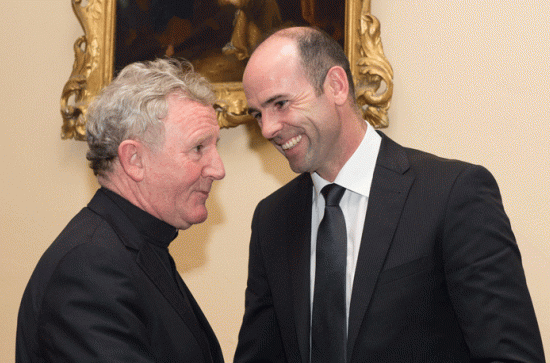
In African conflict environments where people are killed, maimed and displaced persistently, values such as peace, truth, justice and mercy cannot take deep root, nor can people live normal lives or experience true peace, according to Fr. Patrick Devine SMA, delivering the fourth Lt. Gen. Dermot Earley Memorial Lecture in Maynooth University today. Fr. Devine is the founder and International Chairman of the Shalom Centre for Conflict Resolution and Reconciliation, based in Kenya.
“Communities cannot experience sustained development because periodically schools, hospitals, industrial and formation institutions become inoperable or totally destroyed. We will be forever rebuilding and rehabilitating institutions if we do not address the root causes of conflict,” he told a large audience assembled by the Edward M. Kennedy Institute for Conflict Resolution in association with the Irish Defence Forces of which the late Dermot Earley was Chief of Staff.
Describing the tasks that Shalom carry out, he explained how: “We train and empower local community leaders in conflict transformation because we want local leaders and communities to be able to analyse and transform conflict in their own areas, without persistently relying on external intervention.
He continued: “We conduct empirical research, to the highest academic rigor, into the underlying causes of a conflict because we are adamant to fully understand the causes and the driver dynamics of the conflict which are too often ignored when ‘quick-fixes’ are applied. This informs local conflict transformation interventions and policy direction for advocacy and implementation.
“We work to influence government policies at local, national and regional levels because government is primarily responsible for promoting peace and social progress but also bearing in mind that government structures, institutions and policy can also be a significant contributing factor causing conflict, for example, between pastoralist communities.
“We strengthen religious and civic organisations with conflict transformation capacities and system perspectives to enable them to address conflict and promote peace because these organisations (religions institutions, missionaries, NGOs) are
frequently best placed to provide conflict early warning when tension and crisis are brewing, and also be present to support the ongoing transformation and resolution.
“We develop and construct inter-ethnic institutions, especially schools, and design and promote peace education syllabus into educational institutes at all levels. This includes the provision of solar energy for consistent power supply, computers, desks, and books, especially in areas of entrenched violent conflict. We want to ensure that children are given a better future, that they learn to live with others who are different to themselves, while being enriched by the diversity of cultural heritage, thus, working to reduce conflict in the long-term.
“The peace and development nexus is crucial, not only for conflict transformation and peace building, but also for embracing cultural heritage and providing the platform for creative artistic expression in the future.
Describing the accomplishments of Shalom to date, Fr. Devine revealed that over 10,000 key community opinion shapers have been trained professionally in conflict transformation skills and peace-building skills in northern Kenya traversing the borders of Ethiopia, South Sudan, Uganda, and among the Somalian community. Over 340 workshops have been held among 16 tribes in conflict zones.
Over 300 schools projects, many inter-ethnic and inter-religious, have been completed. Peace syllabus introduced along with desks, books and equipment, and 500 units of solar energy installed providing electricity for 150,000 students.
“In the past, we have provided training for police officers on the prevention of political violence during turbulent elections. Bearing in mind that 1,256 people were killed in 2008, approximately 60,000 maimed, and 500,000 displaced the level of violence was diminished during recent presidential election but even the loss of one life is too much,” he concluded.
